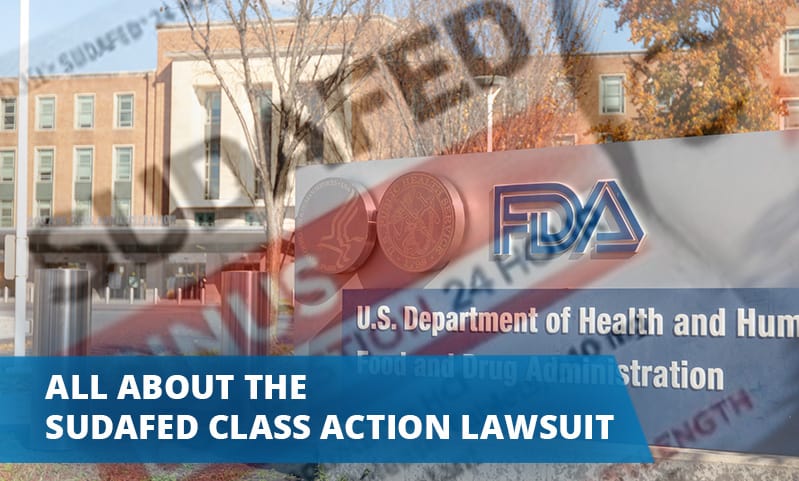Following a Food and Drug Administration finding that the decongestant phenylephrine is no more effective than a placebo, a Minnesota consumer filed a class action lawsuit against Kenvue, Inc. and McNeil Consumer Healthcare, former divisions of Johnson & Johnson.
“Had Plaintiff known that the phenylephrine-containing Products were entirely ineffective as a nasal decongestant, she would not have purchased them, or would have paid substantially less for them,” the lawsuit states. “Accordingly, Plaintiff, on behalf of herself and all other consumers of Defendants’ phenylephrine products, seeks to hold Defendants accountable for their deceptions, breaches of warranties, and violations of Minnesota consumer protection statutes.”
The Sudafed class action lawsuit seeks to represent all persons in Minnesota who purchased an oral nasal decongestant containing phenylephrine manufactured by the defendants.
Drug Trials
The placebo effect is common in medicine and an important component of medicine efficacy. If patients think the drug makes them better, their parasympathetic nervous systems kick into gear. Rest-and-digest nervous system functions include:
- Lower heart rate and less heart contraction,
- Constriction of the ciliary muscle and the pupil for near vision,
- Increased lacrimal and salivary glands activity (drooling while you sleep),
- Better gut motility,
- Improved liver functions,
- Swelling of the clitoris and erection of the penis, and
- Immune system activation.
The placebo effect is negligible in experimental drugs. People don’t know whether the medicine will make them feel better or not. Therefore, scientists usually adjust clinical trial results to account for this fact.
Phenylephrine, which became commercially available in 1938, isn’t as effective as pseudoephedrine, a similar drug. Researchers have known that for a long time. But pseudoephedrine is a key ingredient in methamphetamines. Therefore, laws restrict its availability. But anyone with money can pick up some Sudafed at the store.
The body of research on Phenylephrine dates back to the 1970s, well after the drug was approved. Researchers began looking closer at Phenylephrine’s effectiveness in 2007. Based on their conclusions, the Food and Drug Administration withdrew the indication “for the temporary relief of nasal congestion associated with sinusitis” in 2007.
Then, in September 2023, an FDA independent advisory committee unanimously agreed that there is insufficient evidence showing that “orally administered phenylephrine is effective as a nasal decongestant.” The committee unanimously ruled that the matter needs no further study. The FDA responded to the committee, stating it would take its advice under advisement, but stopped short of issuing a recall.
Liability Issues
Usually, ineffective drug claims are fraud claims. In a nutshell, fraud is the intentional misstatement of a material fact, if the maker tells the fib to secure monetary gain.
Drug fraud is very hard on consumers. They depend entirely upon someone else for all information about all the medicine they take. They cannot possibly confirm or refute any statements the drug manufacturer makes.
For this reason, an attorney can usually obtain substantial compensation in these claims. This compensation usually includes:
- Compensatory damages for medical bills and lost wages, and
- Punitive damages that deter future misconduct.
Compensatory damages are available if an attorney proves fraud by a preponderance of the evidence, or more likely than not.
Furthermore, and probably more importantly, compensatory damages force companies to accept responsibility for the errors they make.
Punitive damages are available if an attorney proves, by clear and convincing evidence, the defendant intentionally disregards a known risk.
Large punitive damages awards force drug companies to change the way they do business.
Class Action Nuts and Bolts
Large judgments get a company’s attention. Large groups of consumers also get a company’s attention.
The Federal Rules of Civil procedure determine when consumers and other victims can join forces and launch a class action lawsuit. Some factors to consider include:
- Numerosity,
- Identical nature of the law and facts,
- Efficiency, and
- Novelty of the questions of law or fact.
These aren’t hard and fast rules. Judges have almost united discretion. They can grant or deny class action status almost at will.
Procedurally, class action lawsuits are almost identical to individual lawsuits. One plaintiff, or perhaps a small group of plaintiffs, speaks for everyone. One lawyer, or perhaps a small group of lawyers, represents everyone. Identical nature is very important in class action claims. Everyone must be on the same page.
Class action settlements are usually tiered settlements. Victims who came forward early typically get a greater share of the settlement money. So, if you feel you might have a case, you should at least speak to a lawyer, and do so quickly.
For a free consultation with an experienced legal team, contact Napoli Shkolnik. We accept cases nationwide and do not recover a fee until we win your case.
